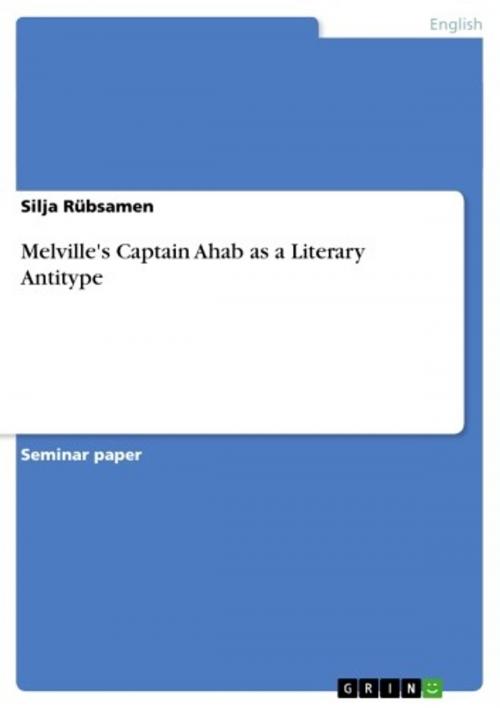| Author: | Silja Rübsamen | ISBN: | 9783638147866 |
| Publisher: | GRIN Publishing | Publication: | October 16, 2002 |
| Imprint: | GRIN Publishing | Language: | English |
| Author: | Silja Rübsamen |
| ISBN: | 9783638147866 |
| Publisher: | GRIN Publishing |
| Publication: | October 16, 2002 |
| Imprint: | GRIN Publishing |
| Language: | English |
Seminar paper from the year 2002 in the subject American Studies - Literature, grade: A, University of Massachusetts - Amherst (English Department), course: English 731: Bible - Myth, Society, Literature, 19 entries in the bibliography, language: English, abstract: 1. Introduction: The Bible as a Source Of all sources for Moby-Dick, the Bible, as an inescapable part of his education, was Melville's best and earliest known one. Herman Melville was raised in a pious middle class perception of religion, and broadened his horizon of knowledge about Scripture and its reception throughout the centuries through the study of biblical commentaries, metaphysical essays, sermons, religious poetry, and of course of the 'opposition': stoic, skeptical, and deist literature. No other major writer of Melville's times makes such extensive use of Scripture. Not even Emerson, with an actual career as an Unitarian minister, or Hawthorne, who grew up in a Salem Calvinist family, make a comparable effort to use the Bible as a source, or to imply comparable grave consequences for the world view of both reader and author in their use of it. Raised with the Bible, Melville's biblical allusions appear with such regularity that their use seems 'not studied but involuntarily.' The spontaneity of their occurrence points to the fact that Melville had internalized the contents and styles of Scripture to an extent that made him employ biblical imagery, characters, and themes as if they had sprung from his own mind. There are about 250 obvious allusions to biblical passages in Moby-Dick , and an almost indefinite number of thematic and stylistic borrowings. Throughout Melville's career as an author, the number of allusions to biblical writings continually rises, from only a dozen in his first novel, Typee, to more than 550 in Clarel, the latter being the only work with more references to Scripture than Moby-Dick. In Nathalia Wright's list of the biblical books which Herman Melville marked and commented upon, the books of Ecclesiastes and Job have most markings, right after the Psalms, Matthew, and Isaiah, which suggests 'close connections [...] between the Bibles he read and the books Melville wrote.' Of the passages thoroughly marked the wisdom sentiments in Job, especially the dialogue between Yahweh and Job in Job, ch. 38ff, as well as the short book of Jonah, are most notable for their recurrence as important features of Melville's novels. [...]
Seminar paper from the year 2002 in the subject American Studies - Literature, grade: A, University of Massachusetts - Amherst (English Department), course: English 731: Bible - Myth, Society, Literature, 19 entries in the bibliography, language: English, abstract: 1. Introduction: The Bible as a Source Of all sources for Moby-Dick, the Bible, as an inescapable part of his education, was Melville's best and earliest known one. Herman Melville was raised in a pious middle class perception of religion, and broadened his horizon of knowledge about Scripture and its reception throughout the centuries through the study of biblical commentaries, metaphysical essays, sermons, religious poetry, and of course of the 'opposition': stoic, skeptical, and deist literature. No other major writer of Melville's times makes such extensive use of Scripture. Not even Emerson, with an actual career as an Unitarian minister, or Hawthorne, who grew up in a Salem Calvinist family, make a comparable effort to use the Bible as a source, or to imply comparable grave consequences for the world view of both reader and author in their use of it. Raised with the Bible, Melville's biblical allusions appear with such regularity that their use seems 'not studied but involuntarily.' The spontaneity of their occurrence points to the fact that Melville had internalized the contents and styles of Scripture to an extent that made him employ biblical imagery, characters, and themes as if they had sprung from his own mind. There are about 250 obvious allusions to biblical passages in Moby-Dick , and an almost indefinite number of thematic and stylistic borrowings. Throughout Melville's career as an author, the number of allusions to biblical writings continually rises, from only a dozen in his first novel, Typee, to more than 550 in Clarel, the latter being the only work with more references to Scripture than Moby-Dick. In Nathalia Wright's list of the biblical books which Herman Melville marked and commented upon, the books of Ecclesiastes and Job have most markings, right after the Psalms, Matthew, and Isaiah, which suggests 'close connections [...] between the Bibles he read and the books Melville wrote.' Of the passages thoroughly marked the wisdom sentiments in Job, especially the dialogue between Yahweh and Job in Job, ch. 38ff, as well as the short book of Jonah, are most notable for their recurrence as important features of Melville's novels. [...]















